At the end of 2021, a political event took place that was quite expected and that can surely have important consequences in different scenarios. This time we are talking about the new German government.
Who she is
Let’s start by saying that Angela Dorothea Merkel was born in Hamburg in former West Germany on July 17, 1954. She is the daughter of the Lutheran pastor Horst Kasner and Herlind Kasner, who was a Latin and English teacher. She has two younger siblings, Marcus (born July 7, 1957) and Irene (born August 19, 1964). Shortly after her birth, her father received a pastorate in the church in Quitzow in the German Democratic Republic, so the family moved to the town of Templin, 80 km north of Berlin.

Merkel was a member of the German Free Youth party. In 1977 she married physicist, Ulrich Merkel. In 1982 she divorced and married Joachim Sauer in 1998.
She was a physics student at the University of Leipzig from 1973 to 1978, where she graduated with a thesis on quantum chemistry. She then worked at the Central Institute for Physical Chemistry of the Academy of Sciences in Berlin, where she received her doctorate in 1986.
Beginnings in politics
Her political career began in 1989 when she joined the growing democracy movement after the fall of the Berlin Wall and joined the new Democratic Awakening party (Demokratischer Aufbruch).
After the first democratic elections in the German Democratic Republic (GDR), she became deputy spokesperson in the new government of Lothar de Maizière, and also took part in the first elections after German reunification.
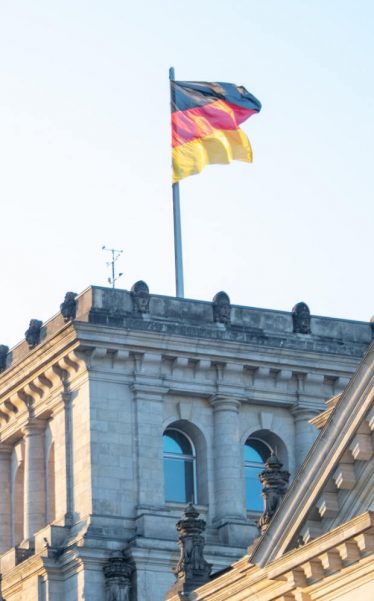
Merkel’s election as president of the Christian Democratic Union of Germany (CDU) in April 2000 came as a surprise, as her characteristics and beliefs did not fit in with the party she had managed to lead.
Merkel belongs to the Protestant majority in northern Germany and the Christian Social Union of Bavaria (CSU), the CDU’s sister party, is a deeply Catholic-rooted, male-dominated, conservative party from southern Germany.
Under its leadership, the CDU had a series of victories in six of the seven provincial elections held up to 2002. However, the CDU/CSU coalition, led by Edmund Stoiber, was defeated in Germany’s 2002 federal elections. Merkel then became the leader of the conservative opposition in the Bundestag, the lower house, replacing Friedrich Merz.
In the spring of 2003, Merkel reproached Gerhard Schröder’s government for not helping to prevent the invasion of Iraq but making it even more likely by weakening the threat of retaliation against the government of Iraqi leader Saddam Hussein.
Chancellorship Moments
After her election in 2005 as Chancellor of Germany, Merkel led a political coalition consisting of the Christian Democratic Union of Germany (CDU), its sister party, the Christian Social Union of Bavaria (CSU), and the Social Democratic Party of Germany (SPD). This coalition lasted until the 2009 elections, when the CDU formed a new coalition, together with the CSU and the Liberal Democratic Party (FDP).
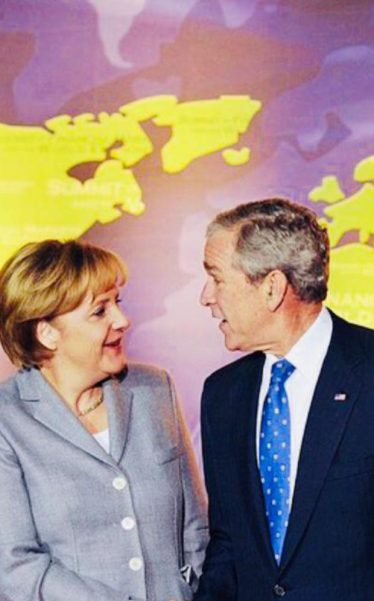
In the 2013 federal elections, Merkel led the CDU/CSU for the third time, winning with around 42 % of the vote.
At that time she again formed a coalition of the CDU/CSU and the SPD. In the 2017 federal elections, her party again won a relative majority and, after re-editing the coalition with the SPD for the second time, she was re-elected for another term.
She had a lot of influence over the European Union (EU) and the decisions that have been being made through it, have been so notorious since her rise to power, that she is considered the de facto leader of the bloc.
Merkel played a key role in bringing the Lisbon Treaty to fruition in 2009.
In mid-2013, in the wake of revelations about mass surveillance. Those revelations were released to the public by the international press between 2013 and 2015, and demonstrate the surveillance that mainly U.S. intelligence agencies, in collaboration with other allied countries, have been massively exercising on the world’s population.
At that time it was discovered that Merkel’s cell phone had been spied on for years by U.S. intelligence; it later emerged that the U.S., from its centrally located Berlin embassy, had been intercepting communications from Berlin’s government district, the seat of government, and parliament.
As a consequence, Merkel compared the U.S. NSA to the Stasi; in response, Susan Rice, National Security Advisor, promised that the U.S. would abandon these practices, although she clarified that no “no spying” agreement would be signed between the two countries.
In addition, since 2017 she has been leading, together with the French government, the process of refounding the European Union, which after the crisis of the coronavirus disease pandemic in 2020, has given impetus to a series of changes of considerable magnitude in the community bloc. The Chancellor has also stood out for her handling of the Great Recession, implementing a policy of austerity and discipline in the EU.
It could not last forever
Angela Merkel as chancellor was not something that could last forever. As a matter of fact, it lasted a long time. They have selected a new chancellor and thus the post-Merkel era has begun.
Merkel is gone. She says goodbye to power after 16 years and she does it as usual, without great fuss, with that singular political style that has marked an era.
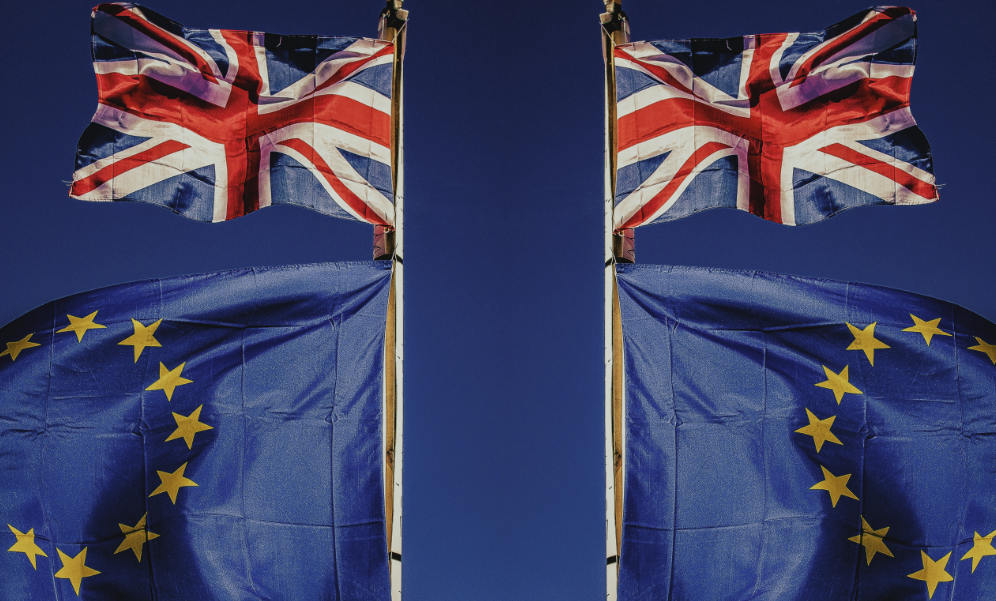
With that very typical political style of hers: it is and was calm, rational, incremental, and in constant search for compromise almost at any price, which has brought her countless successes.
Outside and inside her country, she became an island of political stability in the midst of growing international volatility, and this, in turn, consolidated her as a global leader. But reforms are still pending. For this reason, the post-Merkel era looks very turbulent.
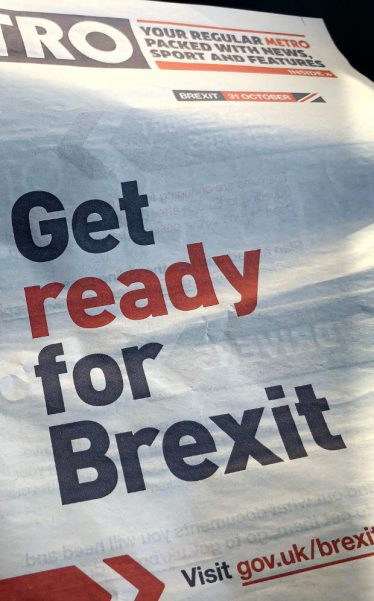
Those who see the glass as half full remember that the United Kingdom left. The EU once again showed itself to be cohesive in the vaccination plan and above all in the pandemic reconstruction fund with which an unknown Merkel crossed a hitherto impassable line in Germany.
She opened the door to joint indebtedness is probably her most important European legacy.
We must bear in mind that in the new reality global threats are proliferating, with the climate emergency at the forefront.
Growing Chinese power, defiant Russian assertiveness, American instability, the questioning of the rule of law within the Union, and trade wars require decisive political action.
The characteristic of Angela Merkel was that her decisions were ultra-measured. She consults experts, reflects, and consults again.
So much so that here in Germany a new verb has even been coined – merkeln – which alludes to this form of shuffling and hesitation when it comes to making decisions.
In Germany, Merkel’s three-plus governments have been marked by political stability and economic prosperity, but the chancellor leaves a long list of unfinished business.
When she came to power in 2005, Germany had more than five million unemployed and was considered the sick man of Europe. Today, the euro zone’s large economy has three million fewer unemployed and urgently needs workers in certain sectors and regions.
We are going to make it
“Wir schaffen das.” We are going to make it. This will probably be the phrase with which Angela Merkel will be remembered over the years.
The humanitarian crisis caused by the refugees was the central issue during her third term in office.
The policies adopted on the issue of bringing refugees to the EU have been harshly criticized by a political and social spectrum of Germany and the European Union, especially after the successive attacks that occurred in 2016 with the signature of refugees and under the Islamic State.
Under the context of the migration crisis in Europe, various media gave her the title of Mutter Angela (translated as Mama Angela) in reference to the policies of solidarity with refugees victims of social and military conflicts in the Middle East.
Merkel’s words in 2015 gace a sense of calm for the humanitarian crisis in Europe. Thousands of people who migrated from countries such as Syria, Iraq, or Afghanistan were at the gates of the old continent without the authorities having acted.
Then, Merkel took the reins and told the Germans that they would accept the refugees.
It was not easy, as the extreme right, led by the Alternative for Germany (AfD) party, was ready to capitalize on the economic-social discontent and the paranoia of insecurity created by this wave of immigration.
The chancellor, as the head of government in Germany is known, is a rare example of duration at the helm of a country at a time when instability has marked world politics.
The pandemic
Her fourth and final term in office was marked by the Covid-19 crisis.
Merkel received positive recognition inside and outside Germany for her handling of the Covid-19 pandemic, especially during the so-called “first wave” in the early to mid-2020s.
In March of that year, she addressed the country on television for the first time in 14 years (apart from the annual Christmas message) to explain the challenge posed by COVID-19.
However, as the pandemic progressed and the health situation in Germany worsened, Merkel was criticized for some of the measures taken.
She made it very clear that the coronavirus pandemic is the biggest test the European Union has faced in its history.
Nothing is eternal
No European leader has been in government longer and none has weathered as many crises as she has, to the point that she has become one of the most recognizable figures on the global scene.
Her admirers value her serenity and pragmatism in the face of great challenges and her ability to maintain the voice of sanity in a world characterized by polarization and strident leadership.
His critics reproach him for excessive conservatism and for not having dared to undertake the reforms that industrial Germany needs to maintain its position in an increasingly digital world.
It is close to my heart to be part of the new success of the CDU in recent times and to be able to take political responsibility for securing our future. I was not born a chancellor or a party leader. I always wanted to do my job within the party and the government with dignity and leave them with dignity. Now, it is that moment. today, at this moment I am overwhelmed by only one feeling, gratitude. For me, it was a great pleasure and honor. Thank you very much.
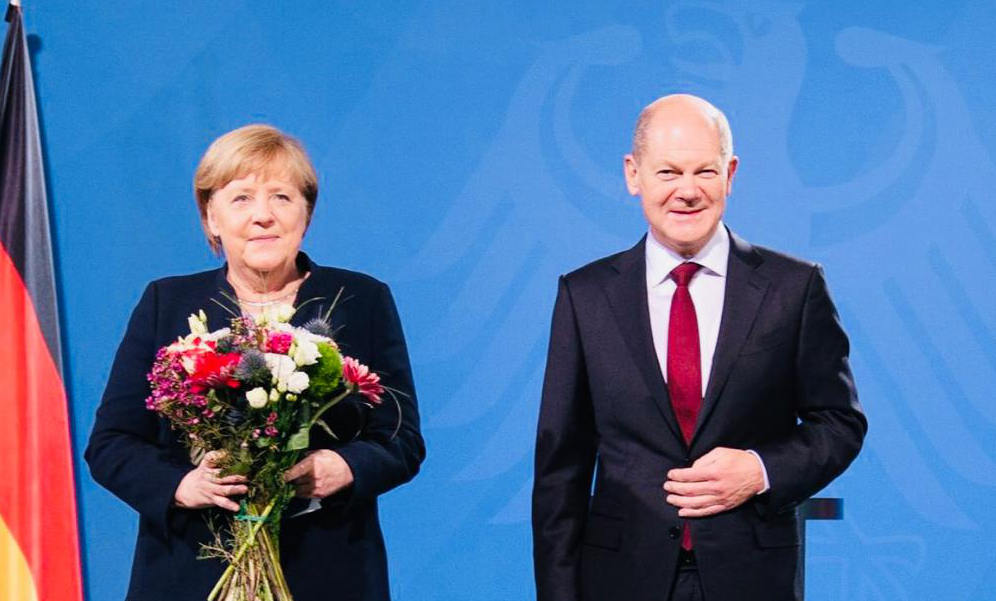
Many questions arise after she, the eternal chancellor, decided to say goodbye. Valuing her legacy still requires time and some distance. The indelible stain of Germany’s austerity policies in Europe is evident. Or having allowed the entry of more than one and a half million refugees in times of xenophobic nationalism.
What we know with absolute certainty is that his four terms in office have been marked by crises of a formidable magnitude. The crises she has experienced have been: the euro crisis, the Ukraine crisis, the refugee crisis, the pandemic, and she has tamed them with an art of negotiation and an ability to weave compromises that she has perfected over the years.
What is certain is that Angela Dorothea Mekel leaves a powerful country at the head of Europe. And it will not be easy to live up to the woman who has marked Germany’s future over the past 16 years.


